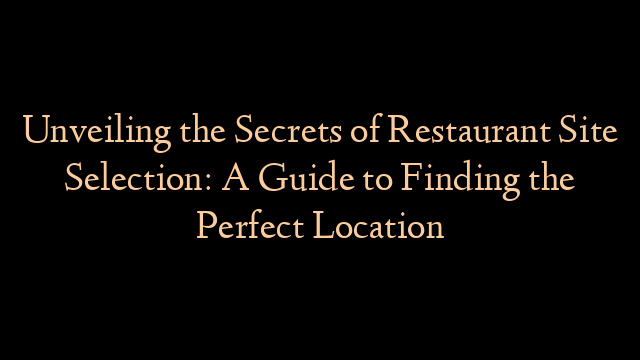Finding the perfect restaurant space is a crucial step in launching a successful culinary venture. The location, layout, and visibility of your restaurant can significantly impact its success. By carefully considering the factors outlined in this guide, you can make an informed decision that will set your restaurant up for long-term prosperity.
Where to Find the Perfect Restaurant Space
There are several avenues to explore when searching for a restaurant space. Commercial real estate agents specialize in finding and negotiating leases for businesses. Online listings and classified ads can also provide a wide selection of available properties. Additionally, networking with other restaurant owners or industry professionals can yield valuable leads.
Considerations for Choosing the Ideal Location
When selecting a restaurant location, several factors should be considered. Accessibility, visibility, and proximity to potential customers are paramount. Research the demographics of the area to ensure your target audience is present. Consider the availability of parking and public transportation options. The location should align with your restaurant’s concept and atmosphere.
Evaluating Market Demand and Competition
Conduct thorough market research to assess the demand for your restaurant concept in the chosen location. Analyze the competition by identifying existing restaurants and their offerings. Determine the market saturation and identify any potential gaps that your restaurant can fill. Consider the target customer base, their preferences, and dining habits.
Identifying High-Traffic Areas and Visibility
High-traffic areas with excellent visibility are desirable for restaurants. Consider locations near major roads, shopping centers, or popular attractions. The exterior of your restaurant should be visually appealing and easy to spot. Good signage and outdoor seating can enhance visibility and attract customers.
Researching Zoning Regulations and Permits
Before signing a lease, it is essential to research zoning regulations and obtain the necessary permits. Ensure that the chosen location is zoned for restaurant use. Contact local authorities to determine the specific requirements and regulations that apply to your business. Failure to comply with zoning laws can result in fines or legal issues.
Exploring Lease Terms and Rental Costs
Negotiating favorable lease terms is crucial for the financial success of your restaurant. Understand the terms of the lease, including the rent amount, lease duration, and renewal options. Consider the operating costs associated with the space, such as utilities, insurance, and property taxes. Ensure that the lease terms align with your business plan and financial projections.


